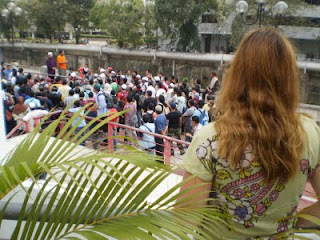
Wherever one travels, they are there. People who live on the streets exist in all parts of the world. Some are there by choice, others through misfortune. Whichever it is, they all have a story to tell, if we take the time to hear it.






Forbes recently announced that the "best" college in America is The U.S. Military Academy at West point. Emphasis on Military. For the uninformed, that's the University of Army.
The college rankings are based on five criteria: graduation rate (how good a college is at helping its students finish on time); the number of national and global awards won by students and faculty; students' satisfaction with their instructors; average debt upon graduation; and postgraduate vocational success as measured by a recent graduate's average salary and alumni achievement. (The ranking institute) "prize(s) the undergraduate experience and how well prepared students are for the real world rather than focusing on inputs such as acceptance rates and test scores." According to these criteria, the top five colleges are:
1. United States Military Academy; 2. Princeton University; 3. California Institute of Technology; 4. Williams College; 5. Harvard University.
 First, it was possible to read every sign in Malaysia. Granted, we couldn't understand most of them, but Malay uses the same alphabet as we do in English. In fact, many English words have been adopted by Malay, probably due to British colonial influence. However, the Malaysians have converted them phonetically: teksi, immigresen, diskoun, ekspres, sentral. While we often struggle painfully to sound out each letter at a time in Thai script (provided we recognize one of their 44 letters), Malay is quite easy to pronounce.
First, it was possible to read every sign in Malaysia. Granted, we couldn't understand most of them, but Malay uses the same alphabet as we do in English. In fact, many English words have been adopted by Malay, probably due to British colonial influence. However, the Malaysians have converted them phonetically: teksi, immigresen, diskoun, ekspres, sentral. While we often struggle painfully to sound out each letter at a time in Thai script (provided we recognize one of their 44 letters), Malay is quite easy to pronounce.




 While on our way to Chinatown's fabric bazaar, we happened upon the famous Bangkok flower market, which lasts all weekend long, each night well into the wee hours of the morning. It is absolutely mind-blowing to walk through the narrow lanes surrounded by explosions of color and the fragrances that lie in layers, the scents lingering in the air and briefly clinging before being left in your wake, giving way to completely new sensations that wait for your passing. I find it difficult to imagine that each of the hundreds of flower merchants are able to profit, but then Thailand is a land of flowers: They are wanted daily by hotels, shops, department stores, temples, and restaurants. So enchanted were we by the flowers that we didn't make it to the bazaar before it closed.
While on our way to Chinatown's fabric bazaar, we happened upon the famous Bangkok flower market, which lasts all weekend long, each night well into the wee hours of the morning. It is absolutely mind-blowing to walk through the narrow lanes surrounded by explosions of color and the fragrances that lie in layers, the scents lingering in the air and briefly clinging before being left in your wake, giving way to completely new sensations that wait for your passing. I find it difficult to imagine that each of the hundreds of flower merchants are able to profit, but then Thailand is a land of flowers: They are wanted daily by hotels, shops, department stores, temples, and restaurants. So enchanted were we by the flowers that we didn't make it to the bazaar before it closed. 


 Catching another taxi at Victory Monument, which was all but abandoned since being taken over by the "red shirts" a few days earlier, we successfully made our way onto the expressway, assisted by a helpful red shirt who removed a barricade at the expressway entrance. We sped over the bridge, and twenty minutes later I was dropped off at the bus station, which strangely, is inside a bustling department store. When I eventually found the ticket window, I was told that my bus was departing immedately. I rushed to the dock where the driver was busy splashing buckets of water on the overheated radiator. Not a good sign. But, we left on time anyway and I resigned myself to the possibility of not reaching the destination on time. At least the air con was working on what I later named the "Kidney Jam Express."
Catching another taxi at Victory Monument, which was all but abandoned since being taken over by the "red shirts" a few days earlier, we successfully made our way onto the expressway, assisted by a helpful red shirt who removed a barricade at the expressway entrance. We sped over the bridge, and twenty minutes later I was dropped off at the bus station, which strangely, is inside a bustling department store. When I eventually found the ticket window, I was told that my bus was departing immedately. I rushed to the dock where the driver was busy splashing buckets of water on the overheated radiator. Not a good sign. But, we left on time anyway and I resigned myself to the possibility of not reaching the destination on time. At least the air con was working on what I later named the "Kidney Jam Express."